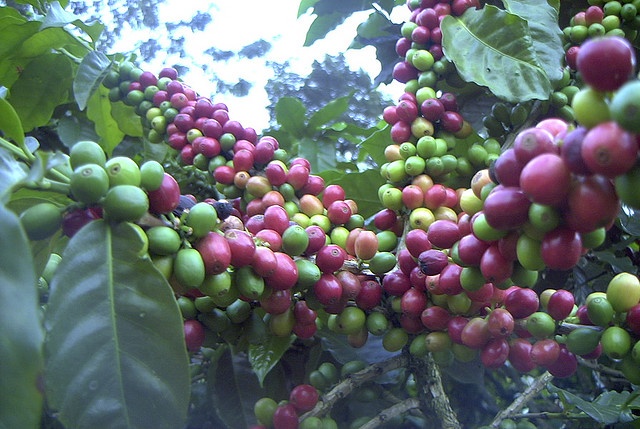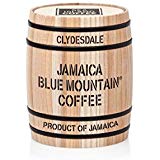Blue Mountain Coffee : Coffees from the Jamaica
Blue Mountains of Jamaica: Coffee beans

Coffee beans get their flavor from the climate where they are grown.
The central Blue Mountains of Jamaica are an extraordinary landscape.
The Blue Mountains in Jamaica offer some of the finest coffee beans ever found.
Jamaica Blue Mountain has been an admired coffee since at least the early 19th century, when for a brief time Jamaica led the world in coffee production. After World War II the British colonial government, alarmed that undisciplined production was on the verge of ruining the Blue Mountain reputation, instituted a rigorous program of regulation and quality control under leadership of the newly established Coffee Industry Board of Jamaica. After Jamaica achieved its independence from Britain, the new Jamaican government continued that coffee policy, requiring that all Blue Mountain be wet-processed at government sanctioned mills and dried, dry-milled, cleaned, and graded at centralized facilities.
The Blue Mountains are named for the blue mist that hovers over the mountains at all times.
Located on the beautiful island of Jamaica, these mountains offer the perfect climate for growing fantastic coffee beans.
This lush, tropical region benefits from plenty of rainfall, giving the soil the rich quality needed for growing the gourmet Blue Mountain coffee.
The beautiful Blue Mountains stand at almost 7,500 feet above the sea and make a stunning backdrop for the pristine white beaches.
These mountains house over 194,000 acres which are protected as part of the rain forests.
There are many different species of birds and plants which can only be found in these mountains.
Blue Mountain coffee beans were originally brought to the Jamaican Islands by Sir Nicholas Lawes who hoped the climate would prove productive for these special beans.
Since 1728 these beans have continued to produce extremely well and today coffee is the biggest export of these islands.
Blue Mountain coffee is one of the most sought-after coffees in the world and Japan imports a large part of this coffee.
Blue Mountain coffee offers a bold, rich taste which is also smooth and sweet.
It is grown on small farms instead of being mass produced.
Blue Mountain Estate Coffees. A prolonged recession in Japan (Japan supported Jamaica coffee prices by buying Blue Mountain heavily) and a general, worldwide plunge in coffee prices has the Jamaica Blue Mountain industry in trouble. At the same time, the Coffee Industry Board of Jamaica has embarked on an unprecedented experiment by allowing several farmers to wet-process their Blue Mountain on their farms and export their coffees as separate and distinct estate coffees, rather than as generic Blue Mountain. These new estate Blue Mountains include Alex Twyman’s Old Tavern Estate, and the RSW Estates, a group of three family-owned farms that wet-process their coffees at a common mill. All of these estate coffees are processed using the traditional ferment-and-wash technique, rather than the mechanical demucilage method used to process generic Blue Mountain.
Often it is difficult to obtain because of the high demand for the succulent flavor which can only be found in the Jamaican mountain ranges.
It is often referred to as the champagne of coffees because of its bold, rich taste.
It is also one of the most expensive coffees in the world.
The Threat to Blue Mountain Coffee’s Existence
Blue Mountain coffee is closely monitored by local Jamaican officials to ensure the supreme quality associated with its name.
Jamaica Blue Mountain Coffee!!
Here we take a look at one of the more rare and unique coffees of the world, the Jamaica Blue Mountain!
These officials grade the quality of the coffee bean before they place it in specific categories.
There is close regulation with strict rules which must be met before the coffee bean is offered for sale.
Recent climate changes have posed a threat to Jamaica’s most precious resource.
Hurricane Ivan posed a real threat to not only the coffee industry but the islands themselves.
Ivan is just one of a long line of hurricanes which have threatened the islands over the span of only a few years.
In 1988 Hurricane Gilbert caused considerable damage to the coffee crop which resulted in a drastic price increase.
Each time the island sustains a hit it takes longer for them to rebound which in turn makes the Blue Mountain coffee almost as precious as gold.
Jamaica Blue Mountain’s coffee fame and high prices have encouraged the usual deceptive blender creativity: Blue Mountain Blends that contain very little actual Blue Mountain, or Blue Mountain “Style” blends that contain no Blue Mountain whatsoever. These coffees may be excellent, but they are not Blue Mountain.






